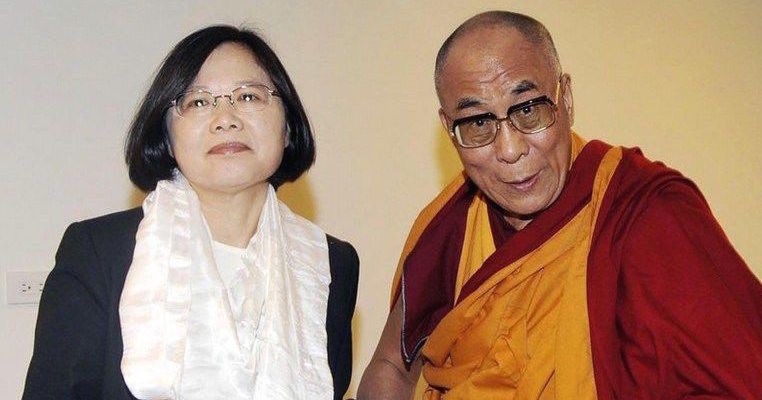
(TibetanReview.net, Mar02’16) – Taiwan President-elect Ms Tsai Ing-wen’s sympathy and support for the Dalai Lama and his Tibetan cause is well known. At the same time, her anxiety not to offend China unduly, given the fact that she leads the independence-inclined Democratic Progressive Party (DPP), has been well reported. So, as she looks to assume her presidency on May 20, longstanding and pending invitations for communist ruled China’s bête noir, the Dalai Lama, to visit the country, hitherto largely denied by the outgoing President Ma-Ying-jeou, in widely seen as presenting her a dilemma and a major challenge in relations with Beijing.
Since sweeping to victory at the polls, Tsai has vowed to seek to maintain the “status quo of peace and stability” with China, Taiwan’s biggest trading partner, and Chinese state-run media have noted her pledges, reported Reuters Mar 1. It added that Tsai must decide whether to let the Dalai Lama in and risk riling China at a time when tensions in the region have already been raised over rival claims to the vital waterways of the South China Sea.
The Dalai Lama, Tibet’s exiled spiritual leader and the 1989 Nobel Peace laureate, fled into exile in India in 1959 after an uprising against Communist Chinese occupation rule. Beijing accuses him of being a separatist, although the globally revered Buddhist monk only seeks meaningful autonomy for his homeland under Chinese sovereignty.
As of now, however, The DPP has said in a statement it was not aware of an invitation for the Dalai Lama to visit Taiwan, said the Reuters report. Likewise, The Dalai Lama’s office in India, where he lives in exile, has said: “His Holiness the Dalai Lama has no plans to visit Taiwan at the present time”.
The Dalai Lama had congratulated Tsai on her “remarkable” victory, saying, “It is indeed encouraging to see how firmly rooted democracy has become in Taiwan.” And he praised Taiwan as “a model and source of inspiration to those who aspire (to) freedom and accountable leadership.”
Beijing and Taipei have been diplomatic and military rivals since their split in 1949 after the Nationalists lost the Chinese civil war and fled to Taiwan. However, trade, investment and tourism have blossomed between the two sides especially during outgoing Ma’s eight-year rule.
* * *
Meanwhile, Chinese Nationalist Party (KMT) Legislator Apollo Chen has, on Feb 29, urged President Ma to issue a visa to the Dalai Lama so the exiled Tibetan spiritual leader could visit before his term ends on May 20, reported Taipei Times Mar 1. He has pointed out that Taiwan was home to more than a million people who follow Tibetan Buddhism and 300 groups specializing in Tibetan Buddhism, adding the religion had permeated into the lives of Taiwanese. The Dalai Lama is seen as the foremost representative of Tibetan Buddhism and Tibetan culture, which makes the government’s refusal to allow him into the nation not only a loss to Buddhists in this county, but also to Taiwan’s religious and cultural development, the report cited Chen as saying.
The Dalai Lama has visited Taiwan in 1997 under the KMT presidency of Lee Teng-hui, in 2001 under the DPP presidency of Chen Shui-bian, and in 2009 under outgoing KMT president Ma. However, ever since his 2009 trip, the Ma administration has repeatedly denied a visa to the Dalai Lama because of China, Chen has said in a statement.
The Aug-Sep, 2009 visit was at the invitation of seven DPP mayors and county commissioners and they asked him to hold religious services for the victims of the devastating Morakot typhoon.
Taipei Times noted that Ma only approved the request for a visa for the Dalai Lama for that trip after the National Security Council met in a five-hour emergency meeting. The government had previously rejected a visa application in 2008, shortly after Ma took office. In Nov 2012, Taiwan’s Ministry of Foreign Affairs also rejected a visa application when the Dalai Lama was invited by an international group to attend a conference in Taipei. And in Mar 2015, then-premier Mao Chi-kuo said the “nation’s benefits as a whole” should be taken into account when deciding whether to issue a visa to the Dalai Lama. This was after 15 Taiwanese groups had issued a joint invitation for him to visit. However, a visa application was not submitted at that time.


